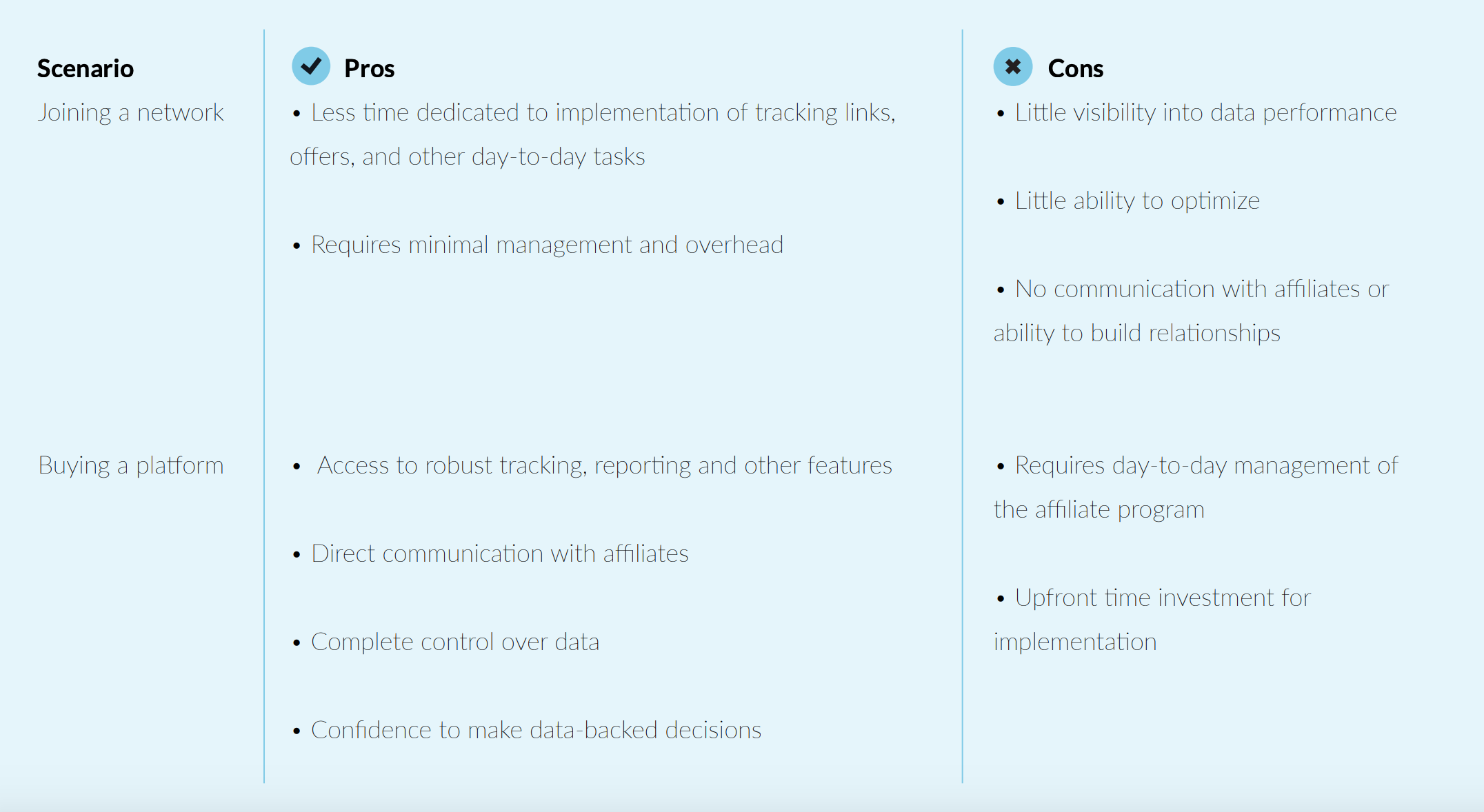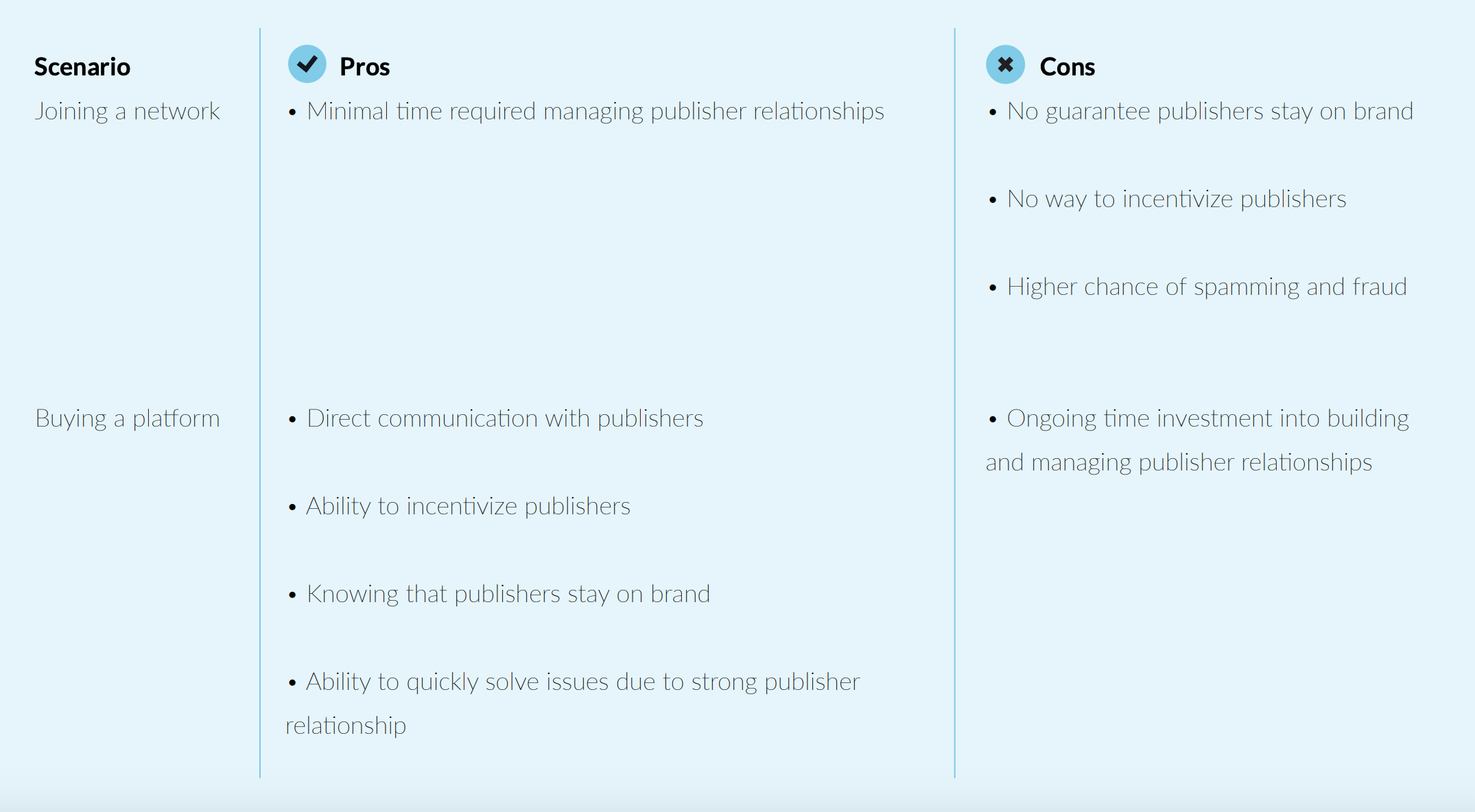How to Start An Affiliate Program
The question of how to start an affiliate program arises often, as more and more businesses choose to add partner marketing to their overall media mix. For businesses new to affiliate marketing, this content will provide a useful introduction. Businesses that are more experienced in affiliated marketing can use this information as a valuable refresher.
Affiliate marketing is one type of performance marketing. Performance marketing is a measurable method of advertising that tracks clicks and conversions, giving clearer insight into how marketing dollars are spent and where users are coming from. Businesses pay publishers a commission fee for each lead or sale that is driven from the publisher to the advertiser’s website. This relationship results in more traffic to the business’s website, and ultimately more revenue. Performance marketing provides a win-win solution for all parties.
When starting an affiliate program, businesses with marketing spend are faced with two choices: sign up with an existing ad network, or buy a tracking software to run their own affiliate program. To understand the difference between these options and make the best choice for your business, we’ve compiled pros and cons for both sides.
Option #1: Buy Affiliate Tracking Software
Affiliate tracking software like TUNE allows a business to effectively manage their internal marketing campaigns, publisher relationships, invoices, and much more — all under one dashboard. Real-time data analytics and reporting enables strategic management of advertising spend and informed decision making.
Unlike affiliate advertising networks, most tracking platforms are unbiased, giving you control and ownership over the data. There are usually no offer marketplaces provided within the tracking platform, and publisher relationships are managed directly by the user. In addition, most affiliate tracking platforms are self-service and require day-to-day management, and with that, give direct insight into publisher relationships.
(If you choose this option, sign up for a free trial of the TUNE Partner Marketing Platform and read Learn How to Gain Affiliates to kick start your affiliate program.)
Option 2: Sign Up With An Affiliate Network
An affiliate network provides advertisers with a marketplace of publishers who are willing to promote the advertiser’s goods or services on their own websites and marketing channels. Think of an affiliate network as the middleman who connects advertisers with publishers. Advertisers are able to easily reach a large audience, while publishers are able to find affiliate programs that are suitable for their traffic types through an ad network. Affiliate networks oversee these relationships and take on the role of management.
The more costly option, joining an affiliate network grants advertisers a hands-off way of promoting their product or service through a wide variety of publisher channels.
Affiliate Program Vocabulary
Many words are interchangeable or loosely defined in the affiliate marketing space. Before diving into the pros and cons of joining an affiliate network or purchasing a tracking platform, here are definitions of key industry terms:
-
Affiliate Program: A program offered by advertisers that gives affiliates the opportunity for compensation in exchange for promoting their product or service. Affiliates are paid by the advertiser when a predetermined conversion point occurs, for example, a user makes a purchase, fills out a form, or signs up for a service.
-
Affiliate Tracking Software (also known as a performance marketing platform, affiliate program software, or, in TUNE's case, partner marketing platform): Software that empowers businesses to track and manage their publisher relationships and marketing efforts directly under one dashboard.
-
Affiliate Network (also known as a network or ad network): A company that acts as the relationship middle-man between advertisers and publishers, so advertisers are free to focus on their products and services, and publishers are free to focus on promoting offers.
-
Advertiser (also known as merchant, brand or marketer): An owner of a product or service looking to pay publishers to drive targeted traffic to their brand, with the end goal of increasing revenue.
-
Publisher (also known as affiliate or partner): A marketer who promotes advertiser products and services by driving traffic to their websites through paid or non-paid channels. They generate revenue for the advertiser and get paid each time a predetermined trackable user action occurs.
-
Traffic (also known as users or visitors): Actions that are measurable against an ad. Impressions (ad view), clicks (ad click), and conversions (ad engagement) are the most common examples.
There are a number of factors that should be considered when deciding whether to buy a tracking platform or sign up with a network. Some of the most important considerations include cost, time, and current publisher relationships. Now that you’re familiar with industry terms, we will highlight the pros and cons associated with different factors in order for you to make the best decision for your business.
Affiliate Programs: Upfront Cost
When considering the role that budget plays in both scenarios, it is important to be aware of the difference in cost associated with affiliate networks and tracking platforms, starting with the fact that many networks require a sign-up fee.
In comparison, starting with an affiliate tracking platform commonly requires a budget for advertising the program in order to gain publishers. The good news is, tracking platforms do not require a fee and in most cases offer a free trial period.

Affiliate Programs: Ongoing Costs
Signing up for a tracking platform and joining a network present different ongoing costs. When signing up for a tracking platform, businesses need to consider the cost of managing the affiliate program. Depending on the specifics of the program, the range of salary costs can span one individual working part time, to a small or large team working full time to manage an affiliate program. Although management costs are greater, all other costs are minimal. Most tracking platforms bill on a subscription basis and charge a much lower, predictable amount.
On the contrary, when joining an affiliate network, the cost of management is lower but all other ongoing costs can be significantly higher. Networks commonly charge based on a percentage of affiliate commission or a percentage of sales generated through your affiliate program. Although percentages often vary, the network fee alone is typically around 30% of user purchases (this does not include affiliate payout). Besides network fees, additional costs include affiliate commission fees, monthly minimum fees, and service costs.

Affiliate Programs: Time Cost
For businesses starting in performance marketing, managing affiliates and developing the product can quickly take up a significant chunk of your time. However, how time is spent differs among those who purchase affiliate tracking software and those who join an affiliate network.
When joining an ad network, less time is spent managing affiliates, but the tradeoff is paying the ad network to do that work for you and having less visibility over the data. On the other hand, tracking software requires more upfront time investment, yet also provides ownership over data-backed decisions and optimizations. Below is how we think about the time tradeoffs for joining an affiliate network versus buying an affiliate tracking platform.

Affiliate Programs: Publisher Relationships
One of the greatest differences between signing up for affiliate tracking software and joining an affiliate network is the type of relationships a business is able to form with publishers. Choosing to sign up with a tracking platform allows a business to maintain an open line of communication with publishers, which brings about a number of benefits. Direct communication enables a business to establish trust, which makes affiliates more inclined to prioritize their offers. Other benefits include the ability to identify the best performing publishers and incentivize them with rewards, and assurance that publishers are aligned with business objectives and stay on brand via data transparency.
When joining an affiliate network, communication with publishers is minimal, or in most cases, nonexistent. Businesses have little visibility into the publishers who are promoting their product or service, leading to a higher chances of fraudulent activity.

A Final Word on Starting An Affiliate Program
There are both advantages and disadvantages to buying affiliate tracking software and signing up with an affiliate network. For businesses seeking a quick, hands-off way of launching a short-term affiliate program, signing up with a network is the best option. However, it is important to be aware of the tradeoffs: Joining an affiliate network is far more costly in the long run, and can significantly limit your ability to scale.
For businesses prioritizing scalability, buying an affiliate marketing tracking solution may be the right decision for you. Although there are advertising costs and affiliate management overhead associated with this option, the ongoing costs are lower and more predictable, which sets businesses up for long-term growth.
Some businesses may find themselves caught somewhere in the middle. If that sounds like you, feel free to reach out to [email protected] to learn how to get started, or request a demo or a trial of TUNE today.
Author
Becky is the Senior Content Marketing Manager at TUNE. Before TUNE, she handled content strategy and marketing communications at several tech startups in the Bay Area. Becky received her bachelor's degree in English from Wake Forest University. After a decade in San Francisco and Seattle, she has returned home to Charleston, SC, where you can find her strolling through Hampton Park with her pup and enjoying the simple things between adventures with friends and family.
